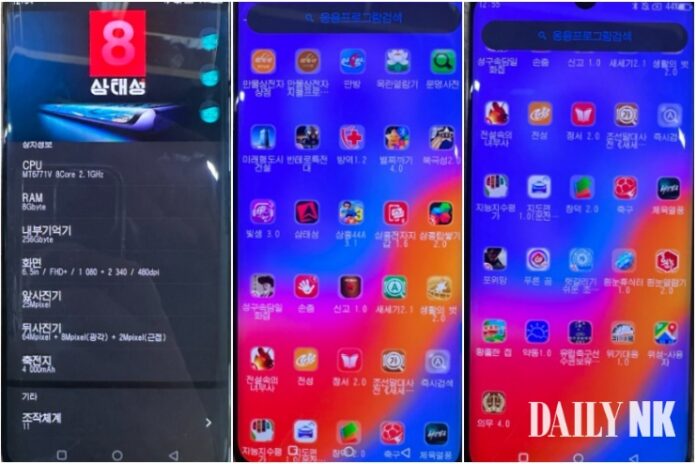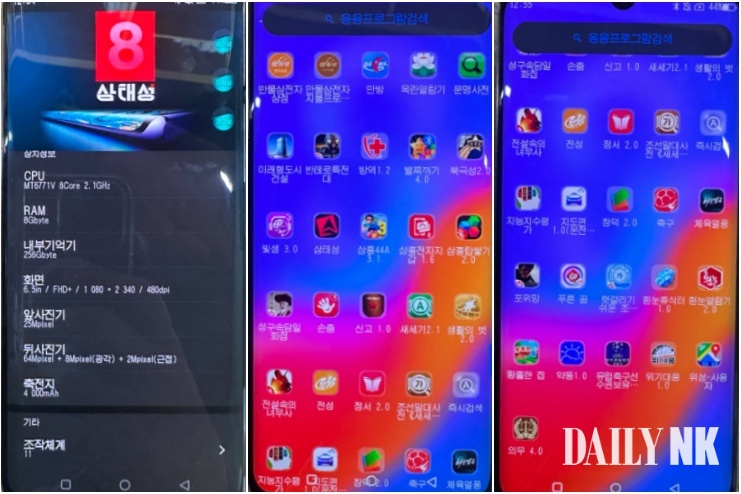 The home screen of the Samtaesung 8 cellphone. The far left image shows the device’s specifications, while the center and right-hand images show programs installed on the device.
The home screen of the Samtaesung 8 cellphone. The far left image shows the device’s specifications, while the center and right-hand images show programs installed on the device.A fascinating glimpse into North Korea’s technology sector has emerged through analysis of the Samtaesong 8, a North Korean smartphone. Daily NK’s examination of the device uncovered database files containing information about 435 organizations—ranging from banks and department stores to companies developing artificial intelligence. The findings offer rare insights into the secretive nation’s tech companies, particularly those working on smartphones and AI.
Tech ambitions take shape
Among the most intriguing discoveries is the Phurun Hanul Corporation, which appears to manufacture a North Korean smartphone called Phurun Hanul (meaning “blue sky”). The company describes itself as a comprehensive tech firm that brings together IT research, manufacturing, and services, supported by a team of 20-30 researchers.
What’s particularly noteworthy is the company’s production capabilities. The Phurun Hanul Electronic Products Factory claims to have developed a complete production line that handles everything from circuit board manufacturing to final packaging. According to the database, they’ve built the industrial foundation to produce integrated circuit boards and IT products using CKD (complete knock down), OEM (original equipment manufacturer), and ODM (original design manufacturer) approaches.
This suggests North Korea has moved beyond simply assembling pre-made components—it now appears capable of taking on design and manufacturing contracts for other companies’ products.
The database also reveals that North Korea is actively pursuing artificial intelligence development. Leading this effort is the Future Technology Exchange Company, which operates under Kimchaek University of Technology and develops software based on deep neural network technology. Another company, the Chonha Foreign Economic Corporation, is described as specializing in smartphone and AI development for both domestic and international markets. While this hints at potential AI exports, no such trade has been confirmed.
Beyond technology
The smartphone’s database also sheds light on North Korea’s evolving banking landscape. Several financial institutions are listed, including Chonha Credit Bank in Pyongyang, which emphasizes customer confidentiality and deposit security. Yusong Bank offers various services from domestic payments to card services, while Isang Credit Bank focuses on commercial and trade financing.
These developments align with research showing North Korea’s efforts to meet growing demand for commercial financial services, often through partnerships between wealthy entrepreneurs (donju) and foreign investors.
Beyond the business world, the database offers intriguing details about entertainment and lifestyle in Pyongyang. Pyongyang No. 1, a floating restaurant on the Taedong River, provides wedding catering services and specialty bulgogi while offering scenic views of the capital. The 23-floor Ryugyong Golden Plaza appears to be North Korea’s version of a modern lifestyle center, combining shopping with offices, banquet halls, and even a swimming pool—designed as a one-stop destination for business and recreation.
What this all reveals
These database entries provide a rare window into North Korea’s domestic economy and technological ambitions. They suggest a country working to develop indigenous tech capabilities while building the financial and commercial infrastructure to support a more complex economy. Whether these efforts will translate into competitive products or successful exports remains to be seen, but the scope of activity described indicates significant investment in technological development.
